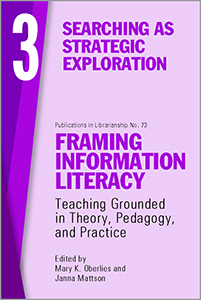Primary tabs
You don't need to be an ALA Member to purchase from the ALA Store, but you'll be asked to create an online account/profile during checkout to proceed. This Web Account is for both Members and non-Members. Note that your ALA Member discount will be applied at the final step of the checkout process.
If you are Tax-Exempt, please verify that your account is currently set up as exempt before placing your order, as our new fulfillment center will need current documentation. Learn how to verify here.
- Description
- Table of Contents
- About the authors
Searching as Strategic Exploration
Searching for information is often nonlinear and iterative, requiring the evaluation of a range of information sources and the mental flexibility to pursue alternate avenues as new understanding develops.
Many librarians struggle with the best methods, activities, and practices for teaching information literacy. Developing learning outcomes and activities, overcoming student and faculty apathy toward information literacy instruction, and meeting instructional and institutional goals can be difficult if you’re feeling overwhelmed with instructional jargon, or uncertain in your teaching due to no formal training.
Framing Information Literacy: Teaching Grounded in Theory, Pedagogy, and Practice is a collection of lesson plans grounded in theory and the ACRL Framework for Information Literacy for Higher Education. 52 chapters over six volumes provide approachable explanations of the ACRL Frames, various learning theory, pedagogy, and instructional strategies, and how they are used to inform the development of information literacy lesson plans and learning activities. Each volume explores one frame, in which chapters are grouped by broad disciplinary focus: social sciences, arts and humanities, science and engineering, and multidisciplinary. Every chapter starts with a discussion about how the author(s) created the lesson, any partnerships they nurtured, and an explanation of the frame and methodology and how it relates to the development of the lesson, and provides information about technology needs, pre-instruction work, learning outcomes, essential and optional learning activities, how the lesson can be modified to accommodate different classroom setups and time frames, and assessment.
The six volumes of Framing Information Literacy aim to address the teaching anxiety and insecurity librarians often experience by offering narratives with the lesson plans that provide insight into the work involved in developing a polished lesson plan; begin filling the teaching and learning knowledge gap for librarians in the context of information literacy, capturing the knowledge and practice of fifty-eight teacher librarians and five teaching faculty from forty-one institutions for others to incorporate and build upon; and to explore how teacher librarians use the ACRL Framework in conjunction with educational theory and pedagogy to help readers form their own approaches to teaching information literacy.
Each volume contains the table of contents and index for the entire set, as well as an overarching introduction and conclusion, for easy cross-referencing across volumes. Explore your favorite frame, or collect them all!
Acknowledgements
Introduction
Mary K. Oberlies and Janna Mattson, MLS
Volume 3. Searching as Strategic Exploration
Chapter 17. Gathering, Evaluating, and Strategic Exploration
Jannette L. Finch and Jolanda-Pieta van Arnhem, College of Charleston
Chapter 18. Together We Learn: Applying Social Constructivism in Library Instruction
Laura Skinner, Piedmont Virginia Community College and Anna Mary Williford, University of Montevallo
Chapter 19. Hashtags & Filter Bubbles: Guiding Students on Their Research Quest
Kelly Diamond and Laura Brady, West Virginia University
Chapter 20. Strategic Topic Development: An Active, Flipped Lesson for First-Year Students
Tiffany Davis, Mount Saint Mary College
Social Science
Chapter 21. Pause for a Station Break: Applying Constructivist Theory to Strategic Exploration
Joanna Gadsby, University of Maryland, Baltimore County
Chapter 22. Fostering Creative Thinking and Reflexive Evaluation in Searching: Instructional Scaffolding and the Zone of Proximal Development in Information Literacy Acquisition
Melissa Clark, Stephen F. Austin State University
Chapter 23. Using Cooperative Learning to Encourage Students to MeSH Up Their Searches
Heather A. Johnson, Dartmouth College
Chapter 24. Engineering Study Abroad as Strategic Exploration
Emily Frank, Louisiana State University and Amanda MacDonald, Virginia Tech
Chapter 25. Alleviating the Pain: Teaching Research Skills to Doctoral Nursing Students
Jessica Sender, Michigan State University
Chapter 26. Data Discovery: Facilitating the Search for Statistical Information in the Library Classroom
Elizabeth Soergel, University of Maryland, College Park
Conclusion
Index
Mary K. Oberlies
Mary K. Oberlies is the Undergraduate Engagement Librarian and Assistant Librarian at the University of Oregon. She received her MAIS from the University of Missouri-Columbia, an MA in Violence, Terrorism, and Security from Queen's University at Belfast, and a BA in International Studies from Berry College.
Janna Mattson
Janna Mattson is the Instructional and Social Sciences Librarian at George Mason University. She received her MEd from George Mason University along with a graduate certificate in eLearning, an MLS from Queens College, City University of New York, and a BA in Music from Virginia Commonwealth University.



